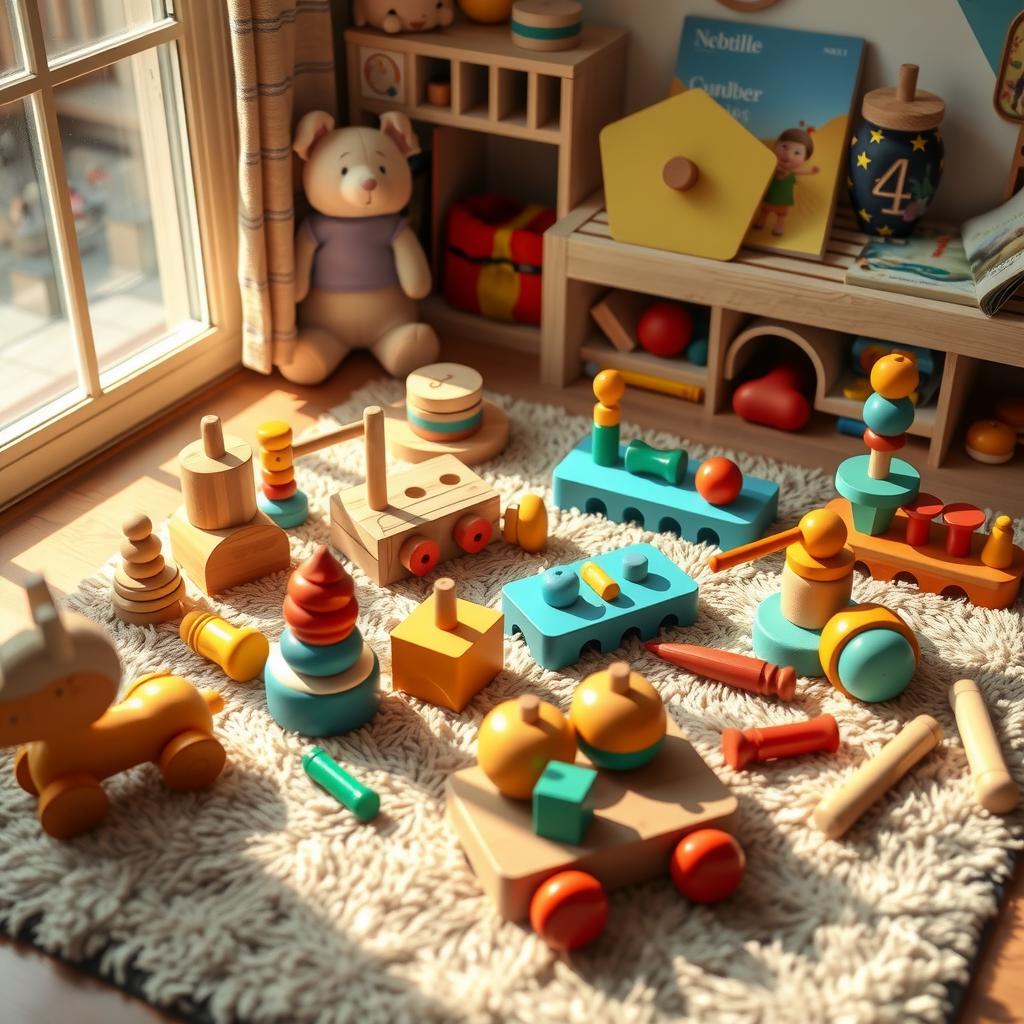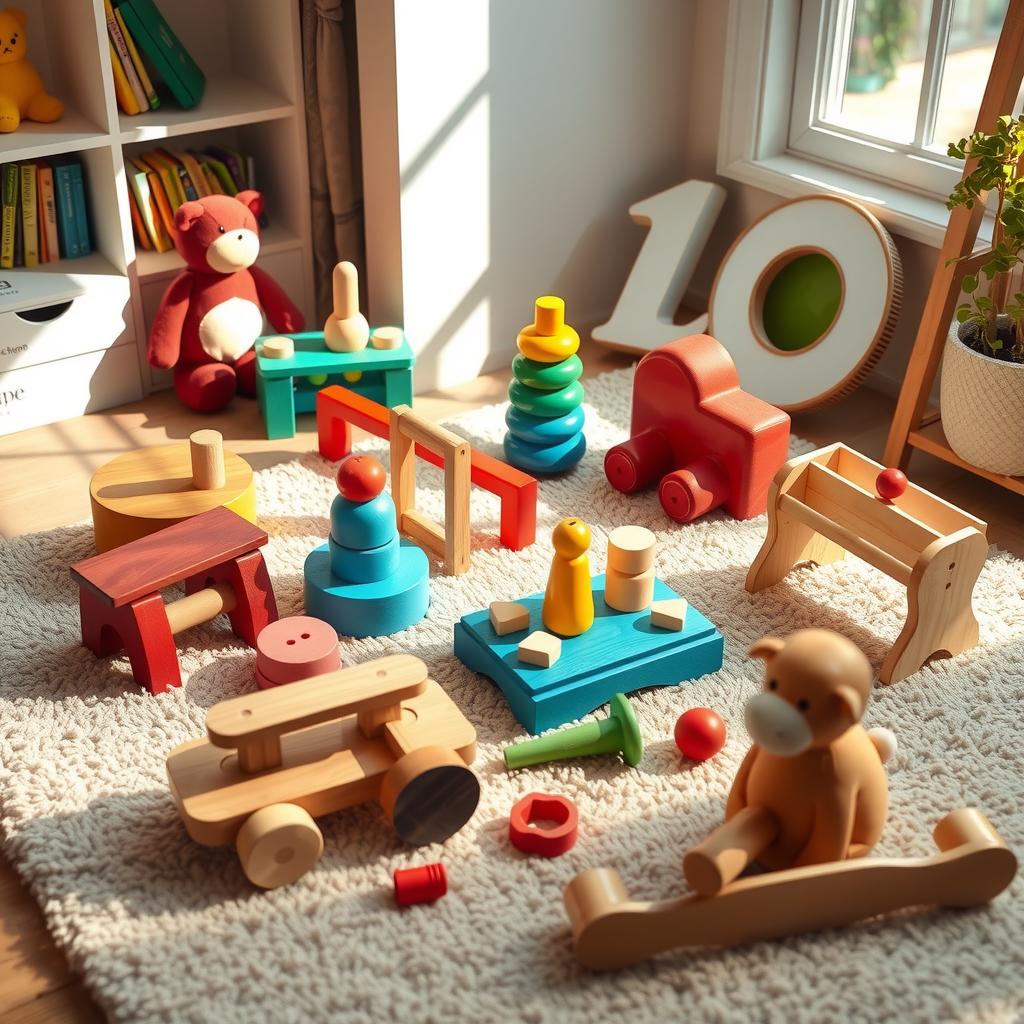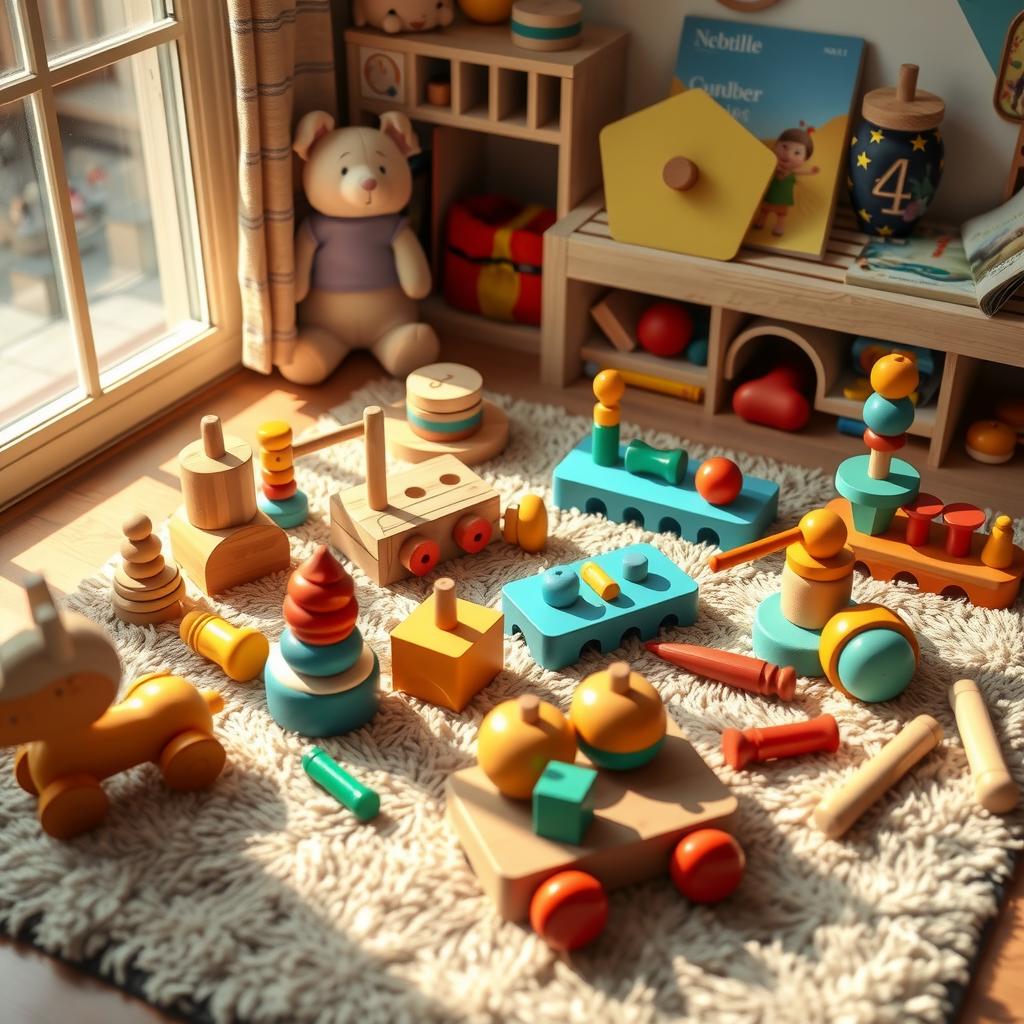In a world increasingly dominated by screens and digital distractions, parents often find themselves grappling with the challenge of selecting toys that not only entertain but also promote healthy development in their toddlers. The importance of choosing the right play materials cannot be overstated; they are more than just sources of amusement—they serve as essential tools for learning and growth. Among the myriad options available, wooden Montessori toys stand out as exceptional choices that blend educational value with sensory engagement. These thoughtfully designed toys cater to young children’s natural curiosity while fostering critical skills such as fine motor coordination, problem-solving abilities, and social interaction.
The core philosophy behind Montessori education emphasizes hands-on learning experiences tailored to each child’s unique developmental stage. This approach aligns perfectly with the characteristics of Montessori toys, which prioritize simplicity and functionality over flashy designs or excessive stimulation. By incorporating elements like texture, color, and movement, these educational toys encourage toddlers to explore their environment actively while supporting their cognitive development through self-directed play.
Moreover, safety is paramount when it comes to children’s playthings. Parents can have peace of mind knowing that most wooden Montessori toys are made from natural materials free from harmful chemicals—an aspect that enhances child safety without compromising on creativity or imagination. As caregivers navigate the vast landscape of toddler products available today, it becomes crucial to recognize how certain options can significantly contribute to early childhood education.
This blog post delves into 15 remarkable examples of wooden Montessori toys for toddlers, highlighting their benefits not only in terms of fun but also as effective learning tools that support comprehensive toddler development through engaging sensory play experiences. By understanding how these products can enrich a child’s formative years while reinforcing essential life skills, readers will discover valuable insights into making informed choices for nurturing growth during this pivotal stage in life. Join us on this journey as we unpack the wonders these timeless wooden treasures offer for little learners everywhere!

Key points:
-
Title of the point: Engaging Play Experiences with Wooden Montessori Toys
The allure of wooden Montessori toys lies in their ability to create engaging play experiences that captivate toddlers. These educational tools are designed to stimulate a child’s imagination while promoting hands-on learning. Through activities such as stacking blocks and manipulating shapes, children enhance their fine motor skills and develop coordination. The tactile nature of wooden materials allows for sensory play that encourages exploration and creativity, making these toys not just fun but essential for toddler development. -
Title of the point: Safety and Durability in Educational Choices
When it comes to selecting toys, child safety is paramount for parents. Wooden Montessori toys offer peace of mind as they are crafted from safe, non-toxic materials free from harmful chemicals often found in plastic counterparts. Additionally, these durable products stand the test of time; unlike many other toy options that may wear out or break easily, wooden toys maintain their appeal through years of use. This durability not only contributes to financial savings but also aligns with eco-friendly practices by reducing waste—an important consideration for environmentally conscious families. -
Title of the point: Nurturing Independence through Open-Ended Learning Tools
One key aspect of early childhood education is fostering independence in young learners. The versatility inherent in Montessori toys made from wood supports this goal by encouraging open-ended exploration during playtime. Toddlers can engage with these educational tools at their own pace, allowing them to make choices based on individual interests—a vital component for self-directed learning. As children discover new ways to interact with their environment using these thoughtfully designed resources, they cultivate problem-solving skills and confidence that will benefit them throughout life.
By integrating quality resources like wooden Montessori toys, parents can significantly contribute to enriching environments conducive to holistic toddler development while ensuring safety and sustainability remain top priorities.

The Essence of Montessori Educational Play
Unveiling the Montessori Approach to Learning Through Play
Montessori principles serve as a guiding light in selecting and utilizing toys that foster educational play, emphasizing hands-on learning and child-led exploration. In a Montessori environment, the choice of wooden Montessori toys is not arbitrary; these carefully crafted educational toys are designed to engage children deeply while promoting their natural curiosity. The philosophy behind this approach champions the idea that toddlers thrive when given opportunities for independent discovery. By providing sensory-rich materials such as wooden toys, educators create an atmosphere conducive to exploratory play where children can manipulate items freely, honing their fine motor skills in the process.
Incorporating elements of nature into children’s play with sustainable materials like wood also aligns with core Montessori values. This connection is essential for fostering an appreciation for the world around them while ensuring safety through tactile experiences. Parents and educators alike recognize that choosing safe yet stimulating learning tools enhances children’s engagement during crucial developmental stages. Moreover, these thoughtfully selected resources allow children to experiment at their own pace—solving problems independently fosters confidence and resilience.
The unique aspect of using Montessori toys lies in their ability to cater not only to individual interests but also diverse learning styles within early childhood education settings. For instance, a simple stacking game made from high-quality wood may seem like mere entertainment; however, it intrinsically teaches concepts such as balance and gravity while simultaneously encouraging cooperative play among peers—a vital social skill at this age.
Furthermore, many parents opt for sensory play activities featuring wooden blocks or puzzles that stimulate cognitive development through touch and manipulation. These types of interactions enable toddlers to gain awareness about shapes, colors, and spatial relationships which contribute significantly towards holistic growth during formative years.
In conclusion, immersing children in environments enriched with mindful selections of educational resources like wooden Montessori toys lays a strong foundation for lifelong learning adventures ahead—an investment into nurturing inquisitive minds capable of navigating complexities beyond early childhood education settings successfully.
The Role of Wooden Montessori Toys in Child Development
Unlocking Potential Through Playful Learning
Wooden Montessori toys serve as exceptional tools for promoting a child’s development during their formative years. These educational toys are designed to stimulate various aspects of growth, making them invaluable resources in early childhood education. One significant advantage is the enhancement of fine motor skills, which are crucial for tasks such as writing and self-care activities. Engaging with wooden blocks, puzzles, and stacking toys encourages children to grasp, manipulate, and balance objects, thereby improving hand-eye coordination and dexterity. As toddlers navigate these playful challenges, they inadvertently strengthen their muscle control while gaining confidence in their abilities.
Furthermore, the natural textures and colors of wooden Montessori toys foster rich sensory play experiences. Sensory play is essential for young children’s cognitive development; it helps them explore the world around them through touch, sight, and sound. By interacting with different shapes and sizes found in these wooden designs—like sensory bins filled with textured materials or colorful sorting games—children can engage multiple senses simultaneously. This kind of exploration not only captivates their curiosity but also aids in developing critical thinking skills as they learn to categorize objects based on various attributes.
In addition to enhancing physical capabilities and sensory awareness, wooden Montessori toys promote creativity by encouraging open-ended play. Unlike conventional plastic toys that often dictate how children should interact with them through preset functions or sounds, wooden options allow for imaginative scenarios where kids can invent stories or create new games entirely from scratch. This freedom fosters an environment where individuality thrives; children feel empowered to express themselves artistically without limitations.
Moreover, safety remains a paramount concern when selecting educational tools for toddlers. Wooden Montessori toys typically feature non-toxic finishes that prioritize child safety while providing robust durability compared to many plastic alternatives—a vital consideration for parents seeking reliable learning tools that withstand time’s wear-and-tear from active play sessions.
As educators continue advocating holistic approaches within early childhood frameworks globally today—with increasing recognition of developmental psychology—the role played by wooden Montessori toys becomes ever more pronounced as superior instruments supporting toddler development across various domains: cognitive growth via problem-solving experiences; social interaction through collaborative gameplay; emotional regulation when faced with challenges posed during hands-on activities—all culminating into well-rounded individuals prepared better equipped towards future learning endeavors! Thus investing time into discovering appropriate wooden toy options could yield substantial long-term benefits far beyond mere entertainment value alone!
Understanding the Importance of Safety in Toy Selection
Prioritizing Your Child’s Well-Being Through Thoughtful Choices
When it comes to selecting toys for children, ensuring safety is paramount. Parents must be vigilant about the materials and construction of toys, as these factors significantly impact a child’s well-being. In this regard, wooden Montessori toys stand out as an excellent option due to their robust design and natural materials. Unlike plastic alternatives that may contain harmful chemicals or break easily, wooden toys are generally free from toxic substances, making them safer for toddlers who explore their world through touch and taste. Moreover, these sustainable options contribute positively to the environment while providing durability that withstands the test of time—ideal for families with multiple children or those who pass down cherished items.
The advantages don’t stop at safety; wooden Montessori toys also play a pivotal role in supporting toddler development. They encourage active engagement and sensory play which are vital during early childhood education. The tactile experience offered by wood allows children to develop fine motor skills as they grasp, stack, or manipulate different shapes and sizes. These engaging learning tools foster creativity and problem-solving abilities while seamlessly blending fun with educational value. Furthermore, parents can rest assured knowing they’re investing in products designed not just for entertainment but holistic child development.
Embracing Sustainability: A Parent’s Responsibility
Choosing Eco-Friendly Toys That Last
In today’s world where environmental awareness is critical, opting for sustainable toy choices reflects a parent’s commitment to nurturing future generations responsibly. Sustainable materials like wood not only reduce reliance on plastics but also promote eco-friendly practices within households. By choosing wooden Montessori toys, parents can instill values of sustainability in their little ones at an early age—encouraging them to appreciate nature while enjoying high-quality educational experiences.
These environmentally conscious decisions do not compromise quality; rather they enhance it by providing sturdy learning tools crafted from renewable resources such as sustainably harvested timber. As opposed to fleeting plastic fads that often end up in landfills after limited use, wooden toys tend to last longer due to their exceptional durability—a characteristic that aligns perfectly with both economic prudence and ecological responsibility.
Moreover, incorporating Montessori-inspired wooden toys into play routines enriches children’s sensory exploration without overwhelming them with excessive stimulation common among many modern electronic gadgets or flashy designs laden with superficial features lacking substantive benefit. The simplicity inherent in these wooden creations encourages deeper focus on tasks at hand which is key for developing concentration skills crucial throughout one’s life journey.
Ultimately, when seeking quality educational tools that ensure child safety while embracing environmental stewardship through longevity—all roads lead back beautifully towards choosing safe yet stimulating options like wooden Montessori toys.
When selecting toys that foster toddler development, wooden Montessori toys stand out for their ability to combine play with purposeful learning. These educational tools are not only designed to engage young children but also encourage the development of crucial skills such as fine motor abilities and sensory exploration. For instance, when toddlers stack blocks or fit shapes into designated spaces, they are not just having fun; they are enhancing their hand-eye coordination and understanding spatial relationships through tactile experiences provided by these thoughtfully crafted wooden materials.
In addition to promoting essential developmental milestones, Montessori toys prioritize child safety. Made from sustainable wood sources and finished with non-toxic paints, parents can rest assured knowing that their little ones are playing with safe materials during sensory playtime. This commitment to safety aligns seamlessly with the values of early childhood education which emphasizes nurturing environments where children can explore freely without unnecessary risks.
Moreover, the durability of wooden Montessori toys ensures that they remain a staple in homes long after initial use. Unlike plastic alternatives that may wear down quickly or lose appeal over time, these educational toys maintain their charm while integrating beautifully into home decor. Their timeless design makes them not only practical but also aesthetically pleasing additions to any child’s play area—an aspect many parents appreciate when considering investments in quality learning tools for toddler development.
FAQ:
Q: What benefits do wooden Montessori toys offer for my toddler?
A: Wooden Montessori toys enhance fine motor skills and promote sensory play through hands-on activities while ensuring child safety with non-toxic materials.
Q: Are wooden Montessori toys suitable for all toddlers?
A: Yes! These educational toys cater to various developmental stages, encouraging open-ended exploration tailored to each child’s interests and abilities.
Q: How do I ensure the longevity of my wooden Montessori toys?
A: Proper care—including cleaning them regularly and storing them safely—will help maintain the durability of your wooden Montessori offerings over time.



